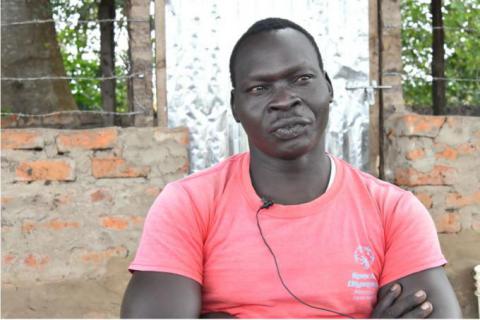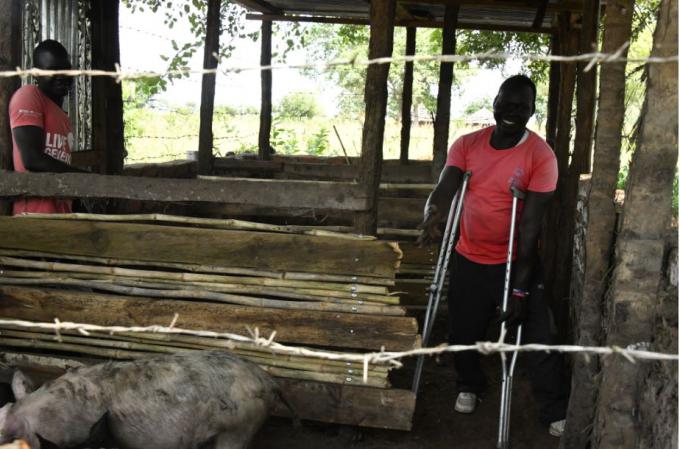Kilimanjaro, 23, a physically challenged returnee and a cobbler, now finds hope in business through piggery
"Before this project, we were suffering, but after the knowledge, skills, and certificates we acquired from the training, each of us are seeking more opportunities - not just in the group - but also getting jobs from the other side to support our lives and their families", said Kilimanjaro. Photo: Tito Justin/Save the Children
Eastern Equatoria, South Sudan - Kilimanjaro, 23, a physically challenged young man aided by two walking sticks is a returnee. Kilimanjaro, a father of six children, used to be a cobbler in Eastern Equatoria but had to escape to Uganda during the 2016 conflict. He returned from the refugee camp in 2020.
As a returnee, his cobbler business doesn’t earn him enough to provide basic needs such as food, tuition fees, medication to his family. Kilimanjaro received training on pig rearing at Magwi College of Agribusiness and Management Science in 2020. He was trained by Save the Children with funding from BMZ and now rears pigs.
Kilimanjaro is the chairman of the Youth Piggery group with a membership of five. Two other members of the Piggery group are also married with children.
A year since, the pigs are increasing. Just recently, they welcomed six piglets and there are signs for more breeding as one of the pig is still pregnant.
Some of the pigs were sold. Out of 4 pigs they sold, the group earned 140,000 South Sudanese Pounds ($350). Kilimanjaro’s group had opened a bank account for saving the money they earn from the piggery business. They use part of the money saved to purchase feeds for the pigs. The pigs love eating raw cabbage and leftover food from town restaurants.
Some of the income is distributed among the members to enrol their children in school and purchase scholastic materials. For Kilimanjaro, he said he used his share of the money to re-establish and expand his cobbling business to selling shoes. He also uses the money to pay school fees for his 6 children from the two wives.
Kilimanjaro smiles to Save the Children's visiting staff inside his piggery house. Photo: Tito Justin/Save the Children
Story in his own words
“I was a refugee in Uganda where I had few options of getting better opportunities. So I came back to South Sudan on self-repatriation. Here I got the opportunity. Save the Children took me to Magwi for training on rearing pigs through BMZ project. We were given 15 pigs and one of them has so far delivered some six piglets. We also sold four of the pigs to purchase other items for the piggery.
We kept part of the money in the bank and part of it was distributed to the members for personal use. Their share helped in taking care of their responsibilities at home - such as paying school fees, purchasing books for the children. It is going well for our group because out of the 4 pigs that we sold, we got 140,000 South Sudanese Pounds [$500].
Before this project, we were suffering, but after the knowledge, skills, and certificates we acquired from the training, each of us are seeking more opportunities - not just in the group - but also getting jobs from the other side to support our lives and their families.
We are very happy with this Save the Children because it supports the youth of South Sudan. I am still a cobbler and this piggery has helped me to get the support of buying items for doing my side business. As a cobbler, I had no support but this piggery has helped me because we sell and borrow some money from the group to buy items like shoes from Uganda, which I sell in my cobbler shop. I also buy some threads and other items. It has helped my children because I have four children schooling now.
When I was just a cobbler, there was limited capital but since I joined this group, all my children are in school; some are in nursery and others are in primary school.”
About the project
Save the Children is implementing a “ssupport to the livelihoods recovery, reintegration and resilience of conflict affected IDPs, returnees and host communities project in Eastern Equatoria, South Sudan. The project is funded by BMZ to sustainably improve the food security and Resilience of IDP, returnees and host communities in EEQ. It targets 142,926 (direct) and 75000 (indirect) beneficiaries. The project is to improve production among households living of agriculture and livestock, diversify youth livelihood and income opportunities through business skill trainings and/or access to credit and reduce acute malnutrition and stunting among under five children.
Story written by: Daniel Danis & Tito Justin/Save the Children
 South Sudan
South Sudan 
